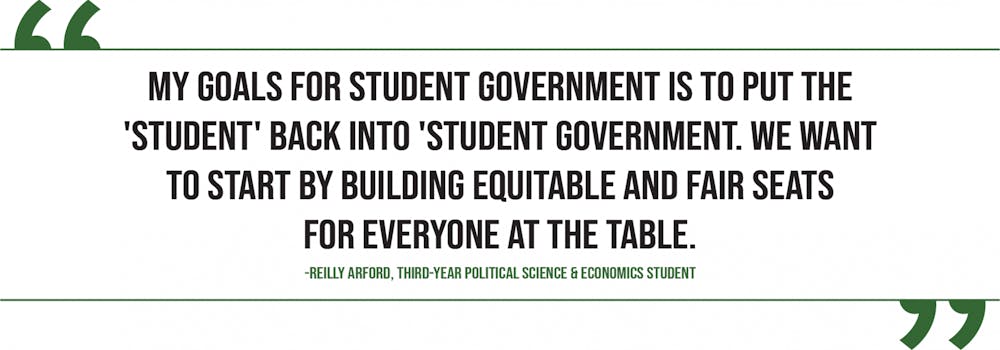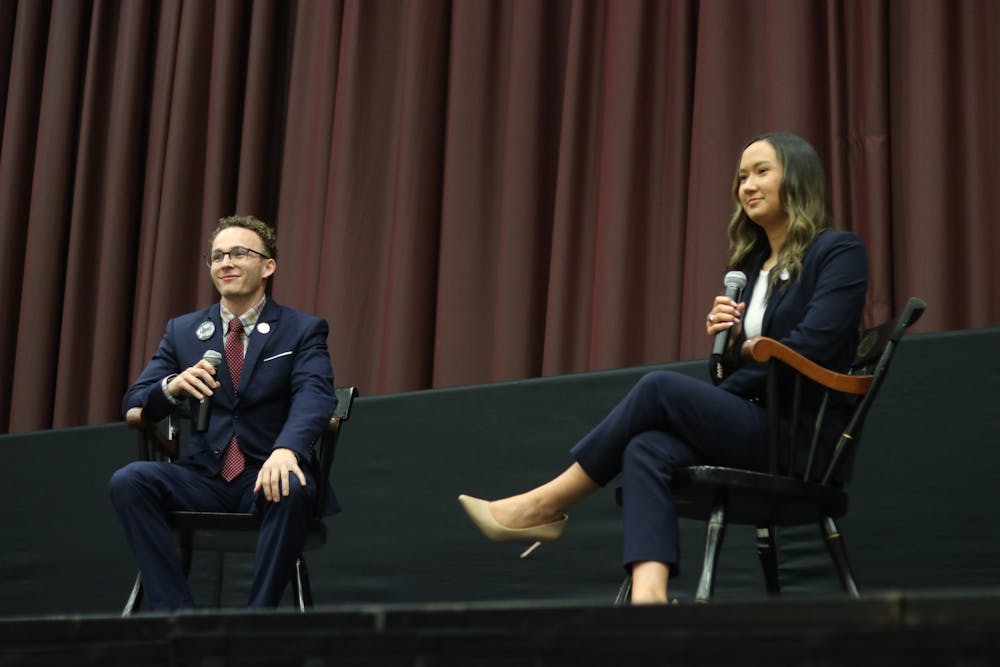Student Government candidates for president and vice president must keep in mind their campaign promises if they win, but they must also be an advocate for students and create a safe home for the Carolina community.
Student Government candidates were announced on Feb. 9. Emily "Emmie" Thompson and Reilly Afford are running for student body president, while Abrianna Reaves is running for vice president on Thompson’s ticket.
Emily “Emmie” Thompson, a third-year public relations student, and Abrianna Reaves, a second-year marketing and finance student.
Thompson and her running mate, Reaves, are campaigning for putting the students first and giving them a voice. It’s important to remember that members of Student Government should be voices for the student body.
Their three main priorities for this campaign include on-campus parking, gameday safety and Carolina Core revitalization.
Parking is and always has been a problem for students. President Michael Amiridis addressed this problem in his Imagine Carolina response, saying, “there will never be enough proximal parking spaces for everyone all at once.”
Thompson and Reaves are trying to create cheaper parking passes for people in need and create a campus parking map that shows students the most convenient places to park.
While offering this resource for students who don’t have the means to buy an outrageously priced parking pass is a step in the right direction, it still doesn’t address the fact that USC doesn’t have much room for parking. While the campus parking map may help students find other places to park that they weren't aware of, the Thompson Reaves campaign need to keep in mind that even if students know where to look, there simply aren't enough spots for everyone.
Another one of their objectives is to make required Carolina Core classes more useful to students as they graduate and go into the workforce.
“For various students, whether it be financial literacy, mental wellness, physical wellness, economics, etc. I think a lot of students would prefer classes like that, that prepare them for more than just their career after college,” Thompson said.
Carolina Core classes eat up a lot of time in students' schedules. If you're a journalism student, you have to take 31-37 credit hours of Carolina Core classes. For a political science student, that number is 32-44 credit hours, and for an electrical engineering student, a minimum of 34 credit hours are required. That equates to over two semesters of Carolina Core classes for students to take, and many of those classes have limited benefit.
If Thompson and Reaves stick to their plan to talk with the Office of the Provost about incorporating classes that will help students in the real world, such as a resume-building class or a tax course, this will be a step in the right direction.
The duo also intends to focus on making Student Government more accessible to everyone.
“A big thing that I want to try and do during my time would be to bring other kinds of people into Student Government, people that are involved in other things on campus, because really representing the whole student body — you can’t do that with just people that are involved in the same organization,” Reaves said.
Both Thompson and Reaves need to show that they are going to be open to working with others, especially Reaves.
Reaves is running unopposed, so it’s important that she shows the student body that she is committed to the role. She must also be prepared for her running mate to lose and be ready to work with her opponent, which she seems ready to do.
“I’m really here to advocate for these issues that students are facing on campus and communicate them effectively,” Reaves said during the Student Government debate. “I don’t think that there should be any difference in that, no matter who I’m working with on the executive.”
Both Thompson and Reaves must remember what campaign promises they made but also understand what students need at any moment will be more important than their original campaign priorities.
Reilly Arford, a third-year political science and economics student
Arford, who is running without a vice president, is focusing his campaign mainly on building, challenging and teaching the student body.
“My goals for Student Government is to put the 'student' back into 'Student Government,'” Arford said during the Student Government debate. “We want to start by building equitable and fair seats for everybody at the table.”

Arford is focusing heavily on diversity, inclusion and equity, including spreading awareness of the treatment of USC’s women athletes.
Female athletes across the nation are underappreciated compared to their male counterparts, and that's partially on us as the consumers of entertainment. For example, the South Carolina women’s basketball team is the reigning national champion and is undefeated this season while the men’s basketball team has lost seven consecutive home games.
Valuing women's sports is just an example of the equity Arford hopes to bring with his administration by diversifying Student Government and his cabinet.
“The first thing I’m going to do is gather a group of very intellectual and like-minded individuals to be a part of my cabinet, and making sure that every single one of them is on the same route and goal,” Arford said.
While this seems like a good plan, Arford needs to keep in mind that Reaves will most likely be a part of his team, and she might not have the same plans as him. But he needs to remember that it shouldn't be about their differences and if he wins, he needs to be willing to compromise with her on things that would benefit students.
One of Arford’s big initiatives is to create a new module "that would fully encompass everything that goes into diversity, equity and inclusion."
This would be like the Alcohol Edu and Sexual Assault Prevention modules that all freshmen are required to complete. He plans to reach out to different departments across campus to help him with this, including the Office of Diversity, Equity and Inclusion, the Student Disability Resource Center, Individuals Respecting Identities and Sexualities and other LGBTQIA+ organizations on campus.
USC already offers a module called Diversity, Inclusion & Belonging for Students, which is described as “an online course that helps students better understand and celebrate the diverse campus community we call home.”
Arford needs to create — and it seems like he plans to — a module that focuses on all aspects of diversity and teaches students the importance of making people of different races, ethnicities, identities, sexualities and physical and mental capabilities feel like they belong.
These candidates need to remember that they are doing this for the student body. Whichever candidate wins must make sure they are keeping an open line of communication with students to be an effective advocate for them to administration.
Voting will begin at 9 a.m. on Feb. 21 and go to 5 p.m. on Feb. 22.

